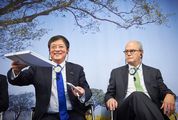PRESIDENT Jacob Zuma on Sunday crunched the numbers, accounting for the past five years in government to African National Congress (ANC) supporters and members at a pre-election rally at FNB Stadium in Gauteng.
Mr Zuma has previously come under criticism for riding on the ANC’s 20 years performance in government and not speaking specifically about his term, which started in 2009.
Sunday’s Siyanqoba rally is the main part of the ANC’s election campaign strategy to build up enthusiasm for Wednesday’s national elections. Siyanqoba means "we are winning".
Four other provincial ANC structures, KwaZulu-Natal, Western Cape, Eastern Cape and Norther Cape are also staging similar rallies, with Mr Zuma’s address expected to be beamed at all venues.
The May 7 elections are the fifth since South Africa’s democracy in 1994, marking a milestone 20 years of freedom with the ANC in charge of government. The polls had been touted as the most hotly contested since 1994.
"We are concluding this election campaign on a high note. There is a lot to be proud about," said Mr Zuma. He said the rally was the ANC’s declaration to the country and world that it was ready to rule South Africa again for the next five years.
Mr Zuma counted the National Development Plan — a long term blueprint for government policies — as one of the main achievements of his administration. He said the past five years, with a focus on education, health, rural development, creating decent work, as well as fighting crime and corruption — have pushed development and transformation forward.
"We will continue focusing on these in the next five years, with emphasis on improving human settlements," said Mr Zuma.
On the Economy
Mr Zuma said South Africa regained the 1-million jobs that had been lost due to the 2008/9 recession. He said more than 15-million people are employed, but, the economy needed to create more jobs. "We have to work harder to get more people employed," said Mr Zuma. He said will work together with business and trade unions to create jobs. The government will also encourage investors, local and foreign, to put money in the economy.
Mr Zuma said his administration had invested R1-trillion for economic development and growth through infrastructure. These are dams, roads infrastructure networks. He said three brand new power stations were being built to improve electricity supply. Government was also looking at alternative energy sources, including solar geysers.
Mr Zuma said infrastructure spending created 775,000 jobs. "Medupi and Kusele employ more than 14,000 each," he said, adding that half these were young people. He said infrastructure components used were produced locally, citing as an example locomotives and solar water geysers. "The ANC in the new term will direct government to buy more than 75% locally," he said.
Mr Zuma said Black Economic Empowerment and Affirmative Action policies are set to continue in the new term. He said the successful implementation would open more opportunities to Blacks, Coloureds, Indians, women, young people and those disabled.
Mr Zuma defended the ANC’s promise o create 6-million job opportunities in next five years. He said since 2009 the expanded public works programme has created 3.9-million work opportunities. Mr Zuma said the ANC’s promise was "based on experience and capacity".
On Labour
Mr Zuma said workers rights protected by changes to labour regime, which ensured that the promise of decent work was fulfilled. However, he said more jobs were still temporary and casual, citing people employed by labour brokers as an example. "They do same job but get paid less. There are no benefits and they are not unionised," he said. He said government will look at the law to ensure that "no worker will be employed as permanent temporary worker".
Mr Zuma said government was looking at the possibility of introducing a national minimum wage and bargaining processes in all sectors "to bring order". The department of labour will be capacitated so that it could enforce government policies.
On Education
Mr Zuma said his administrations has spet R1.3bn on creches, "subsidising toddlers from poor households". More children were enrolled at the Grade R level, set to be made compulsory in the upcoming government term. There were also feeding scheme programmes in schools.
Mr Zuma said the matric pass rate improved from 61% in 2009 to 78% in 2013. He said more focus in the next five years will be on Maths and Science. R115bn has been spent on higher education and training. The budget for the national student financial aid scheme has tripled from R3.1bn in 2009 to R9.6bn in 2014.
The number of artisans grew from 9,000 in 2009 to over 15,000 in 2012. Two new universities and 15 further education and training institutions have been built, and a science university planned in Gauteng in collaboration with the Medunsa.
On health
Mr Zuma said the next phase of national health insurance plan will be implemented in the new term. The plan aims to reduce the costs of private healthcare and improve service at public hospitals. He also said government’s response to the HIV/AIDS pandemic has reduced the scourge. HIV prevention of mother to child transmission has been reduced by 66% in 2011. Mr Zuma said in the next government term treatment will be expanded to more than 4.5-million people, with emphasis placed on prevention.
On Land
Mr Zuma said 5,000 farms have been transferred to black people. He said the settlement of remaining land claims would be accelerated. "Legislation to enable this process was passed by outgoing parliament," he said. He said the claims by Khoi and San people would be covered in the land programme.
On Crime
Mr Zuma said police have worked harder, together with communities, to reduce crime. He said in the next term corruption will be targeted in both public and private sector. Public servants blocked from doing business with government. Mr Zuma said action will be taken against companies involved in bid rigging, price-fixing and corruption in past and current infrastructure projects.
On Human Settlements
Mr Zuma said 550,000 free houses have been built. "Water is still a critical issue due to ageing infrastructure in some municipalities, which frustrates communities".
On poverty
Mr Zuma said government’s poverty alleviation strategies have seen child grants supporting 11-million children. "Poverty should not become a hinderence to child development," he said.

President Jacob Zuma greets supporters of the African National Congress during their final election rally at FNB Stadium in Johannesburg, May 4, 2014. Picture: REUTERS
PRESIDENT Jacob Zuma on Sunday crunched the numbers, accounting for the past five years in government to African National Congress (ANC) supporters and members at a pre-election rally at FNB Stadium in Gauteng.
Mr Zuma has previously come under criticism for riding on the ANC’s 20 years performance in government and not speaking specifically about his term, which started in 2009.
Sunday’s Siyanqoba rally is the main part of the ANC’s election campaign strategy to build up enthusiasm for Wednesday’s national elections. Siyanqoba means "we are winning".
Four other provincial ANC structures, KwaZulu-Natal, Western Cape, Eastern Cape and Norther Cape are also staging similar rallies, with Mr Zuma’s address expected to be beamed at all venues.
The May 7 elections are the fifth since South Africa’s democracy in 1994, marking a milestone 20 years of freedom with the ANC in charge of government. The polls had been touted as the most hotly contested since 1994.
"We are concluding this election campaign on a high note. There is a lot to be proud about," said Mr Zuma. He said the rally was the ANC’s declaration to the country and world that it was ready to rule South Africa again for the next five years.
Mr Zuma counted the National Development Plan — a long term blueprint for government policies — as one of the main achievements of his administration. He said the past five years, with a focus on education, health, rural development, creating decent work, as well as fighting crime and corruption — have pushed development and transformation forward.
"We will continue focusing on these in the next five years, with emphasis on improving human settlements," said Mr Zuma.
On the Economy
Mr Zuma said South Africa regained the 1-million jobs that had been lost due to the 2008/9 recession. He said more than 15-million people are employed, but, the economy needed to create more jobs. "We have to work harder to get more people employed," said Mr Zuma. He said will work together with business and trade unions to create jobs. The government will also encourage investors, local and foreign, to put money in the economy.
Mr Zuma said his administration had invested R1-trillion for economic development and growth through infrastructure. These are dams, roads infrastructure networks. He said three brand new power stations were being built to improve electricity supply. Government was also looking at alternative energy sources, including solar geysers.
Mr Zuma said infrastructure spending created 775,000 jobs. "Medupi and Kusele employ more than 14,000 each," he said, adding that half these were young people. He said infrastructure components used were produced locally, citing as an example locomotives and solar water geysers. "The ANC in the new term will direct government to buy more than 75% locally," he said.
Mr Zuma said Black Economic Empowerment and Affirmative Action policies are set to continue in the new term. He said the successful implementation would open more opportunities to Blacks, Coloureds, Indians, women, young people and those disabled.
Mr Zuma defended the ANC’s promise o create 6-million job opportunities in next five years. He said since 2009 the expanded public works programme has created 3.9-million work opportunities. Mr Zuma said the ANC’s promise was "based on experience and capacity".
On Labour
Mr Zuma said workers rights protected by changes to labour regime, which ensured that the promise of decent work was fulfilled. However, he said more jobs were still temporary and casual, citing people employed by labour brokers as an example. "They do same job but get paid less. There are no benefits and they are not unionised," he said. He said government will look at the law to ensure that "no worker will be employed as permanent temporary worker".
Mr Zuma said government was looking at the possibility of introducing a national minimum wage and bargaining processes in all sectors "to bring order". The department of labour will be capacitated so that it could enforce government policies.
On Education
Mr Zuma said his administrations has spet R1.3bn on creches, "subsidising toddlers from poor households". More children were enrolled at the Grade R level, set to be made compulsory in the upcoming government term. There were also feeding scheme programmes in schools.
Mr Zuma said the matric pass rate improved from 61% in 2009 to 78% in 2013. He said more focus in the next five years will be on Maths and Science. R115bn has been spent on higher education and training. The budget for the national student financial aid scheme has tripled from R3.1bn in 2009 to R9.6bn in 2014.
The number of artisans grew from 9,000 in 2009 to over 15,000 in 2012. Two new universities and 15 further education and training institutions have been built, and a science university planned in Gauteng in collaboration with the Medunsa.
On health
Mr Zuma said the next phase of national health insurance plan will be implemented in the new term. The plan aims to reduce the costs of private healthcare and improve service at public hospitals. He also said government’s response to the HIV/AIDS pandemic has reduced the scourge. HIV prevention of mother to child transmission has been reduced by 66% in 2011. Mr Zuma said in the next government term treatment will be expanded to more than 4.5-million people, with emphasis placed on prevention.
On Land
Mr Zuma said 5,000 farms have been transferred to black people. He said the settlement of remaining land claims would be accelerated. "Legislation to enable this process was passed by outgoing parliament," he said. He said the claims by Khoi and San people would be covered in the land programme.
On Crime
Mr Zuma said police have worked harder, together with communities, to reduce crime. He said in the next term corruption will be targeted in both public and private sector. Public servants blocked from doing business with government. Mr Zuma said action will be taken against companies involved in bid rigging, price-fixing and corruption in past and current infrastructure projects.
On Human Settlements
Mr Zuma said 550,000 free houses have been built. "Water is still a critical issue due to ageing infrastructure in some municipalities, which frustrates communities".
On poverty
Mr Zuma said government’s poverty alleviation strategies have seen child grants supporting 11-million children. "Poverty should not become a hinderence to child development," he said.














 News, views and analysis of South Africa's national and provincial elections on May 7 2014
News, views and analysis of South Africa's national and provincial elections on May 7 2014







Change: -0.67%
Change: -0.74%
Change: -2.14%
Change: -0.47%
Change: -0.11%
Data supplied by Profile Data
Change: -1.44%
Change: -0.40%
Change: -0.67%
Change: 0.00%
Change: -0.56%
Data supplied by Profile Data
Change: 1.32%
Change: 1.37%
Change: 1.07%
Change: 1.10%
Change: 1.05%
Data supplied by Profile Data
Change: 0.11%
Change: -0.31%
Change: 0.26%
Change: -1.21%
Change: -2.22%
Data supplied by Profile Data